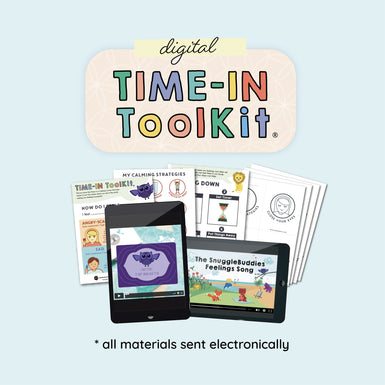Time-Outs are out and Time-Ins are in! Research has shown that punitive discipline and separation-based tactics - aka the Time-Out - are harmful to the developing brain and can lead to stress and trauma.
The GENM team compiled a list of some of our favorite Time-In articles that shine a light on their importance, and how they shape a child's social-emotional intelligence.
Why Time-Outs Are Out And Time-Ins Are In
5 Things To Do When Your Child Doesn't Want To Go To The Calming Corner
What do you do when your child is so deep into their tantrum that they do not want to go to their calm down space ... or even want you near them? Here is a parent's guide.
6 Reasons You May Be Failing Time-Ins
If you are having trouble implementing Time-Ins in your home, or you are wondering if this is right for your family, we have some tips to help bring the science and connection into everyday life.
How To Use A Calming Corner With Kids Under Three
You've likely seen the Calming Corner floating around social media, and you're probably wondering if this adorably cozy setup will work in your home, let alone with your two-year-old. And the answer is YES. Here's how.
One Mama Realizes: My Child's Feelings Are About Her, Not Me
I had done everything right, and yet my nine-year-old daughter was having her version of a tantrum. And then I realized her emotion wasn't about me ... it was about her. Here is how I helped her process her emotions.
Parenting Toddlers, Tweens, and Teens Using Time-Ins
Crystal is a mama with a household of toddlers, tweens, and teens where uncontrollable sobbing and outbursts were a daily occurrence, and not just from her three-year-old.
Peaceful Parenting Tips: How To Do Time-Ins
This video is for anyone who has ever struggled with parenting (all of us), for those who are working to respond to their children instead of reacting to their behaviors, and anyone who wants to raise emotionally healthy humans but isn't sure where to start.
Positive vs. Negative Reinforcement: A Guide for Parents
Learn how positive vs. negative reinforcement influences your parenting style and the ways positive reinforcers can support your child’s development.
Spanking Children Is Still Common and Still Harmful
Research has shown the long-term effects of spanking on a child's mental, emotional, sexual, and behavioral outcomes. And the impact of these negative childhood experiences can directly influence and run the narrative of our adulthood. Read more.
Time-Ins Are Not A Punishment Nor A Reward
Do time-in's "reward" children for being bad? We wanted to strip this question down to the bare bones and address every facet of this misconception. Read more.
Time-In ToolKit Helps Mom Realize: My Son's Behavior Is Normal And Healthy
This mom feared something was wrong with her three-year-old child. And then she realized that his behavior was a sign of healthy brain development.
The Ultimate Guide To Building A Calming Corner And Using Time-Ins At Home
How do you say goodbye to time-outs and introduce time-ins? This is the ultimate guide on the do's and don'ts for building and using a Calming Corner.
Why Time-Outs Increase Power Struggles
When your child misbehaves, how do you respond? Here is why Time-Outs increase power struggles and what you can do instead.
Behavior Charts, Do They Work?
Behavior Charts for Kids: Do They Work?
Behavior charts track behavior, but do they work in actually reforming it? Parents and educators can use this instead to nurture children's social-emotional skills and guide behaviors. Read more.
Why Behavior Charts Don't Work For Most Kids
Behavior charts have been widely used over the past thirty years and while they may achieve the short-term goal of obedience, they miss the long-term goal of building the brain for life-long skills.
Why Using A Behavior Chart Is Ineffective
Before you decide to add to or continue using behavioral management charts, let's take a closer look at the undesirable side effects. Read more.
What To Do When Your Child Tantrums
6 Ways To Deal With A Public Tantrum (Or Prevent Them Altogether)
A public tantrum doesn’t have to be a deal-breaker, but rather a learning moment in the broad scope of a day together. We can let children know with our words and actions that, wherever we are, emotions are safe to feel. Sometimes we can decrease the likelihood of a meltdown.
8 Ways To De-escalate Tantrums With Your Child
Teens and toddlers alike can demonstrate aggressive or uncooperative behaviors from time to time as influenced by big emotions and neurological overwhelm. De-escalation tools help parents defuse a situation and help their child calm and regulate their system.
One Simple Question I Ask Myself To Keep From Yelling At My Child
This mama was able to respond instead of reacting in the face of her son's big tantrum by asking this one simple question.
One family’s journey using time-ins to manage their toddler's big feelings, going from 33 to 3 tantrums a day in just one week.
Staying Mindful During Teen Tantrums
Like young children, teens thrive off feeling safe and connected. Here is how you can navigate a teen tantrum.
Three Ways To Stop Misbehavior
When time-outs didn't work, this mom turned to three things, and it stopped her child's misbehavior.
Why Kids Ignore "No" And What You Can Do About It
If no, don’t, and stop are part of your daily parenting language, you are not alone. But if you find that these phrases are not effective in getting your child to listen, use these seven tools instead.
Emotional Intelligence Builds A Child’s Developing Brain
5 Ways To Nurture Emotional Intelligence For Kids
How can we as adults, parents, grandparents & more, nurture emotional intelligence for kids? 5 ways you can nurture emotional intelligence in children.
6 Ways To Build Resilience In Your Child
Often, our parental instincts encourage us to rescue them from unpleasant emotions or hijack their experiences to keep them safe. And while we cannot protect our children from experiencing stress and distress, we can lean into our love to help them develop skills to handle these challenging moments.
Emotional Intelligence: How To Discipline A Toddler Without Time-Outs
Tantrums happen, but parents can help children handle their big emotions. Here's how to discipline a toddler with a supportive, long-term approach that nurtures emotional intelligence.
Emotional Intelligence is More Than Naming Emotions
Emotional intelligence is more than naming emotions. Remaining calm when our child is emoting requires great patience, often more than we have in reserve.
Enhancing Emotional Development to Treat Child Depression
A recent study shows that focusing on the parent-child relationship and enhancing emotional development may be a powerful and low-risk approach to the treatment of depression.
Gratitude Builds The Brain For Emotional Intelligence
Whether we are thanking our spouse, our kids, Mother Nature, or receiving thanks in return, gratitude in any form can help stabilize emotions, help us parent from our center, and offer our children the safety and connection to learn and grow.
Helping Kids Process Their Emotions Free From Shame
If you’ve ever caught yourself wanting to tell an emotional child to just stop, (so basically, if you are a human being) here are three things to keep in mind that will help you help kids process their emotions free from shame.
How One Child Learned To Manage His Emotions By Watching His Sister
With the use of the Time-In-Toolkit and SnuggleBuddies Plush Toys, one child learned how to manage his emotions by modeling his older sister.
Preschool Teacher Creates Calming Corner to Teach Students About Emotions
In a nook in the back near the teacher’s desk, a cozy, safe place exists. It is a place to explore feelings. A place to regulate. A place to take a break and just be. Welcome to Emily Brown’s preschool classroom.
School Program Uses PeaceMakers to Aide Social-Emotional Skill Building
Fit Abilities Yoga program in the Ferguson MO School District is empowering students by using Generation Mindful's PeaceMakers mantra cards.
Six Ways To Intentionally Raise Kind Children
Research shows that when we shame, blame, and guilt children into kindness, or, quite the opposite, when we dangle carrots (aka external rewards) for caring, children begin to view kindness as a chore rather than a choice. So how do we teach kindness?
Social-Emotional Learning Starts At Home
Students who are self-aware and able to understand their emotions have a greater ability to relate to others, make decisions, and excel academically. Here is how to help your child develop social-emotional skills at home.
Stress And How Emotional Intelligence Can Keep It In Check
Stress is our body’s natural reaction to a challenging or adverse situation, whether real or imagined, which triggers the body’s fight-flight-or-freeze response. By learning to express emotions, listen actively, and consider multiple perspectives, children and adults alike can learn to control stress more effectively.
Study Finds That Emotional Intelligence Moves the Needle on Academic Success
A new study describes emotional intelligence as an important part of academic success from kindergarten into college.
Teaching Emotional Intelligence and College Students as Change-Makers
Dr. Meghan Gillette, a professor in the field of Human Development and Human Studies at Iowa State University, shares the latest research on nurturing emotional intelligence in children ages 5 to 12, how she uses Team-Based Learning, and her insights on teaching social and emotional skills to the next generation.
A young child is so frustrated and overwhelmed that she just hit her big sister. As the adult responsible for managing this moment, how can you navigate this? Enter co-regulation.
Parenting Philosophies
Breaking The Cycle: A Shift from Punitive to Positive Parenting
A shift from punitive punishment to positive parenting. One mama shares her story of breaking the generational cycle of spanking to connection-based childrearing.
Mindful Parenting and How It Affects Children
What is mindful parenting? Learn the benefits and practices of this positive parenting style and how you can integrate it into your child's life.
My Child Is Clingy. Am I Doing It Wrong?
Your child is clingy, seems to be experiencing separation anxiety, and is consistently acting out whenever you leave them, even if just to try to pee alone. Are you doing something wrong as a parent? Not even a little. Here's why. A guide on attachment.
Types of Parenting Styles: Finding Yours and Why It Matters
There are four types of parenting styles and each impacts how your child develops. Learn which one you use and the research behind how they affect kids.


















